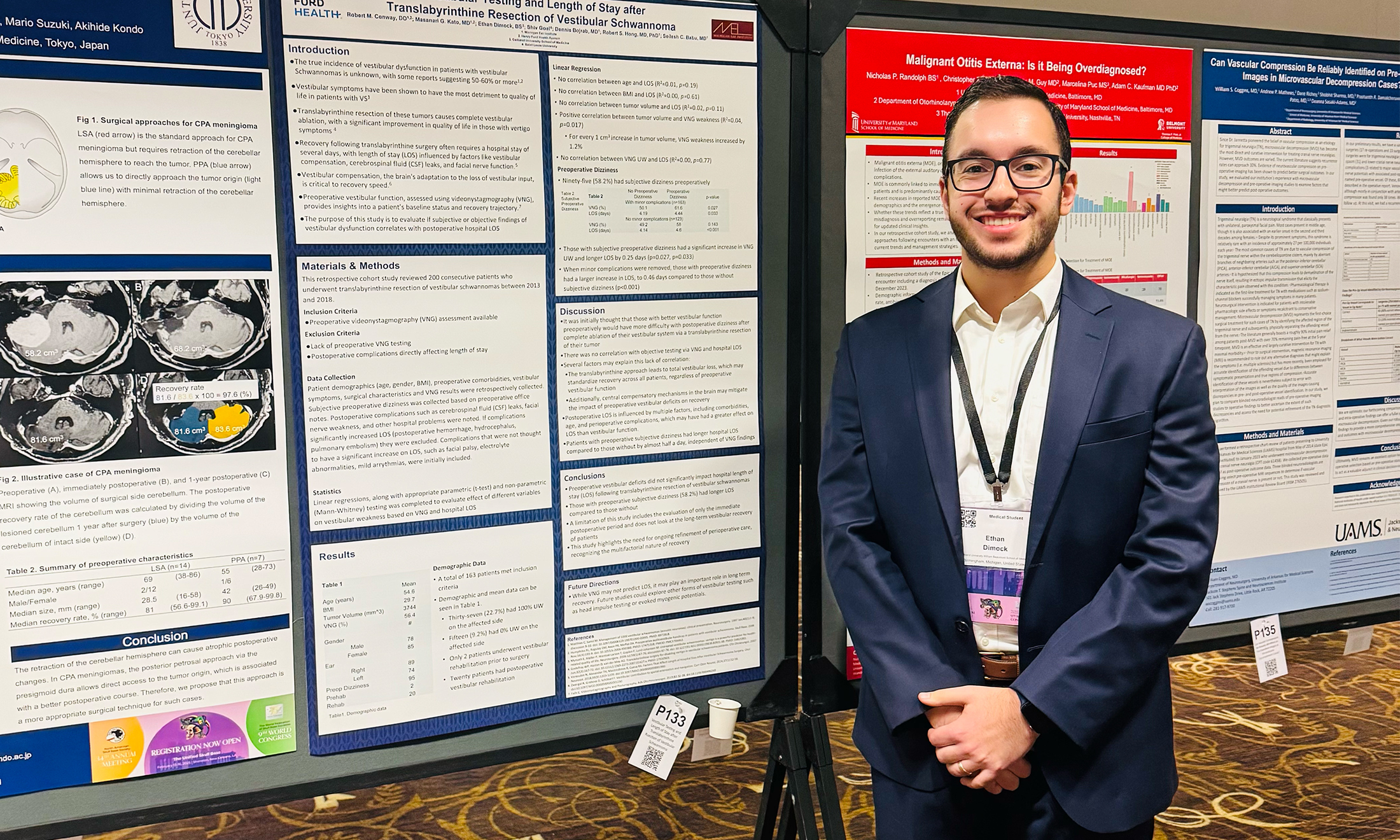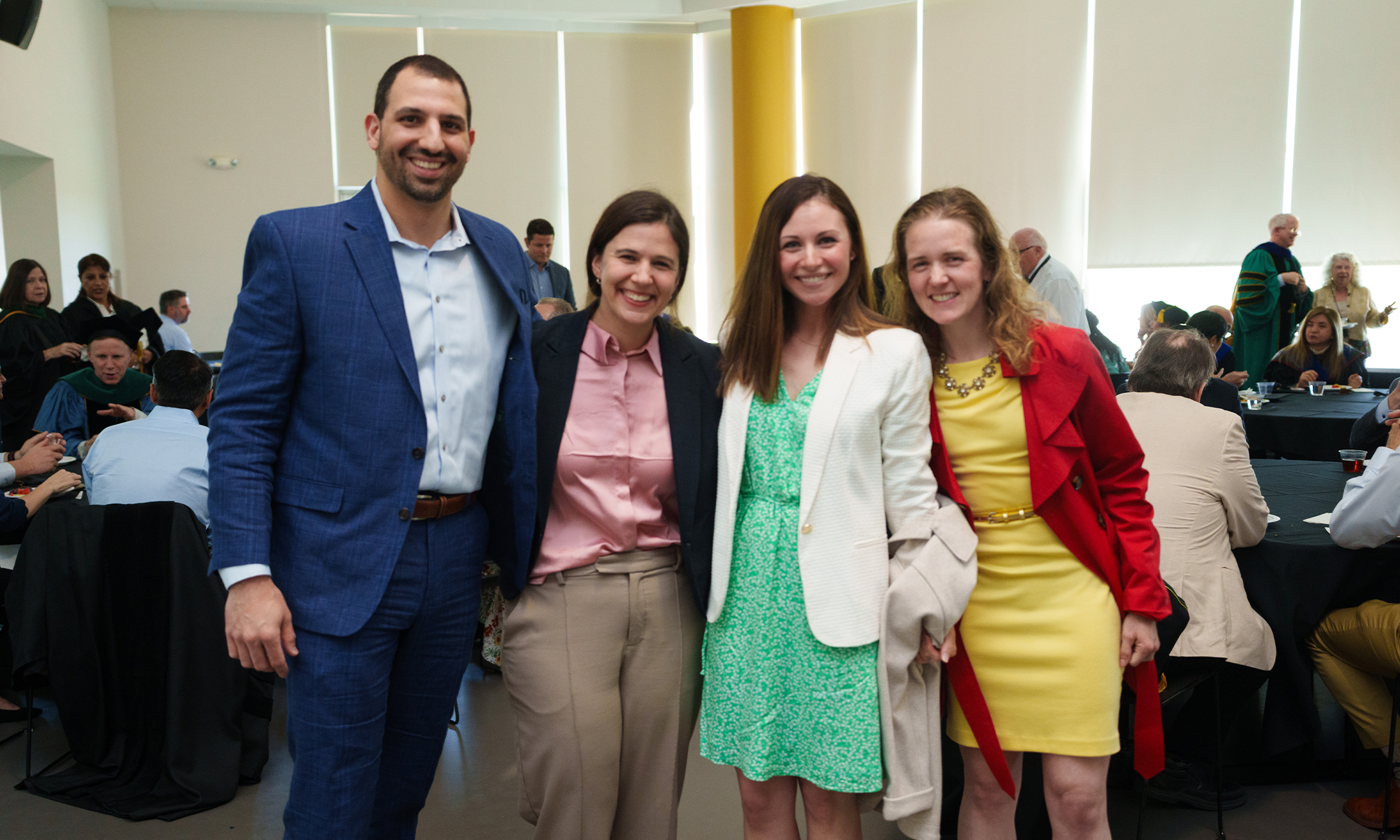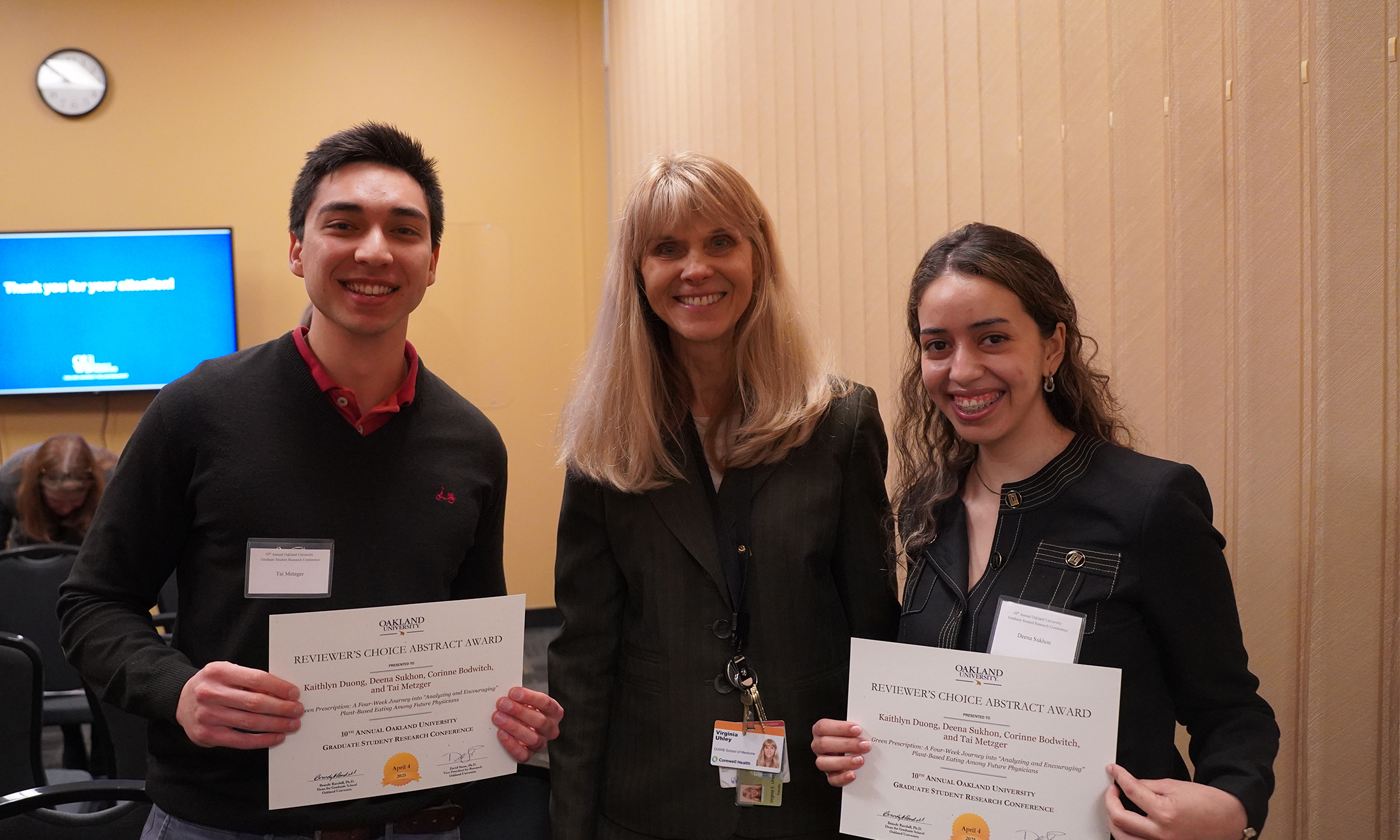An international stage
OUWB student presents cranial nerve research at national conference in New Orleans
An Oakland University William Beaumont School of Medicine student recently had the opportunity to present research on an international stage, highlighting the importance of mentorship and hands-on experience at OUWB.
Ethan Dimock, M4, traveled in February to New Orleans for the North American Skull Base Society (NASBS) annual meeting for a poster presentation on his research.
In short, Dimock’s research took a deep look at the recovery of patients who each had a surgical procedure to remove tumors from the cranial nerves that control balance.
Dimock said there are many benefits to being involved with a project like this, including the potential to help improve patient care and the opportunity to present and network at a conference attended by experts from around the world.
“The fact that (NASBS) allowed me to come and present this work and get to learn and submerse myself in their field was very meaningful to me,” said Dimock. “It's not every day that a medical student gets the opportunity to present at a national conference.”
Foundational research
Dimock said he has been passionate about the specialty of otolaryngology — or ear, nose, and throat (ENT) — since his first year of medical school. Seeking to gain hands-on research experience in the field, Dimock drew help from two mentors: Adam Folbe, M.D., ENT, Corewell Health; and Robert Conway, D.O., ENT, Michigan Ear Institute.
“Dr. Conway was already doing this project, so he introduced me to it, brought me up to speed, and it was something that I was very interested in,” said Dimock.
The research focused on balance function in patients with vestibular schwannomas – tumors that grow on the cranial nerve that controls balance. Dimock examined a surgical procedure known as trans labyrinthine resection, which removes the tumor by accessing the inner ear, ultimately eliminating balance function in the affected ear.
“You can imagine a patient that already can balance pretty well before getting this operation. Now they're getting their balance function completely removed,” explained Dimock.
The researchers hypothesized that patients with a higher preoperative balance function would have a longer recovery period from the operation, compared to those who had minimal balance function before the surgery.
“We hypothesized that, because they already had pretty good balance function before, but now they have this tumor that needs to be removed, they're basically going from 75% function down to zero, that they would have a greater post-operative recovery period than someone that had about 10% function, and now they're going from 10% to 0%,” said Dimock.
The study measured the patient’s balance function using videonystagmography (VNG) – a test that measures the function of the vestibular system by measuring eye movements in response to stimuli. About 200 patients were involved.
“We found that there was no significant relationship between the balance function and the recovery period when using the VNG as a standard,” said Dimock.
However, when the team relied on subject patient reports, such as asking them if they felt dizzy, they found that if patients had had a greater amount of balance before getting the operation, they would have a longer recovery period.
“What we found is that basically, preoperative function did not have any effect on the post-operative recovery when using the VNG to record their balance,” said Dimock.
“The study highlighted the complexity of the post-surgery recovery period, and suggested that future research could explore other factors, such as rehabilitation strategies to optimize the patient outcomes because using VNG is not able to accurately predict the post-operative recovery period.”
Some other findings aligned with expectations, such as a larger tumor correlates with a longer recovery period. However, other anticipated correlations, such as age or BMI, were not observed.
“Sometimes doing research and finding that there is no association is also valuable, because people might think there could be an association, and when we find that there isn't, at least with the patient population we looked at, that can be valuable also,” said Dimock.
While the trans labyrinthine surgical technique has been studied in academia, this project was unique in its focus on whether VNG could predict post-operative recovery time.
“There was no research specifically looking into whether using (VNG) is a way to accurately predict post-operative recovery, and what we found is they can't really predict it as accurately as we'd like,” said Dimock.
“This project could build the foundation to look at other factors for recovery. It's exciting to see what other parameters we could look at because ultimately, we want to see how we can predict and help support patients.”
‘What’s best for the patient’
In addition to the potential to positively affect patient care, Dimock said there were other benefits to the research.
The first was confirmation that he’s on the right track with his plans to specialize in ENT and continue research, specifically on cochlear implants.
“I'm interested in continuing to learn about the ear because it's something that I'm passionate about, but also something that I want to do for the rest of my life. The more that I can immerse myself in those types of experiences, not only benefits me, but it benefits my future patients.”
Dimock also said the project helped him further appreciate OUWB’s dedicated time that allows students to solely focus on research.
Further, the project helped connect Dimock with experts in the field.
“I'm thankful to OUWB for giving us the chance to connect with these physicians, the network is great, and the fact that our school is affiliated with a network like that makes it a lot more attainable for students like me to be able to network and connect with experts in the field that we're interested in.”
And that includes his experiences in New Orleans.
The conference facilitated discussions on different surgical methods and best practices for patient care and treatment. Experts from around the world attended.
“It was really cool to see people that have been established for several years in the field presenting some of their work,” said Dimock. “(And) to see how much experience they have and how much collective knowledge these ENTs from around the world have, and how they apply it.”
One interaction stood out.
“There was one ENT from Australia who was teaching me about his techniques and how they performed this type of surgery differently in their country,” said Dimock.
“It was neat to hear those different perspectives, especially as someone who wants to go into that field. You can never really be too set in your ways, and it's always important to keep learning and seeing what's best for the patient.”

 July 15, 2025
July 15, 2025
 By Mallory Waligora
By Mallory Waligora


